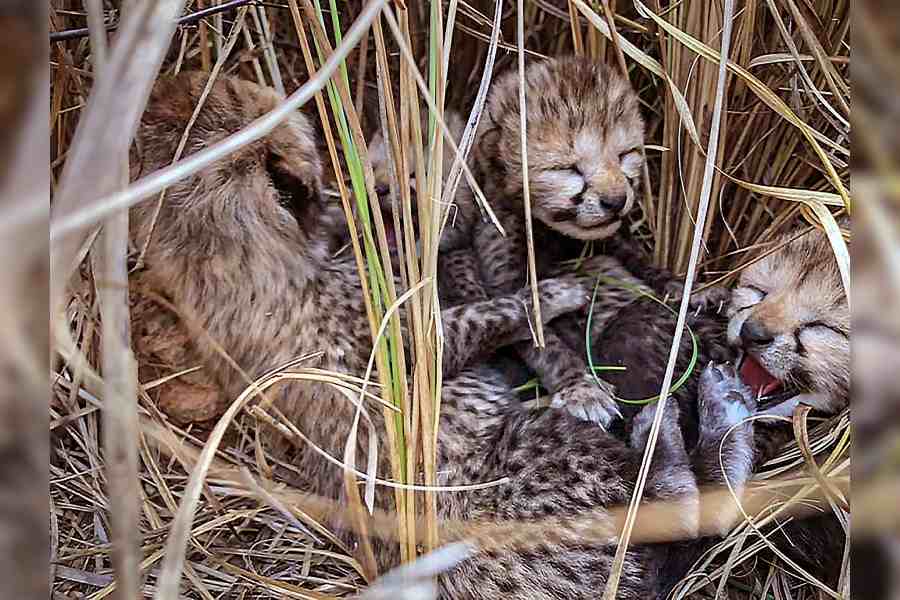The starvation deaths of three cheetah cubs in the Kuno National Park have exposed dissonance among wildlife experts over how to manage any cubs in captivity there — deliver help whenever needed or let nature take its course even if it means some deaths.
Indian wildlife officials have said there was no scope for early action to save the cubs that died on May 23 from severe malnutrition, dehydration and heat. They have said Kuno is not a zoo and the cheetah introduction project seeks to establish cheetahs in the wild, not in captivity.
The officials have attributed the malnutrition to the cheetah mother’s inability to provide sufficient milk or meat to her cubs.
“In natural wild conditions, it is difficult to mitigate the high risk of cheetah cub mortality,” the Union environment ministry has told The Telegraph in response to queries asking whether early intervention by cheetah monitoring teams might have helped save the cubs. The ministry said the project aims “to maintain natural conditions as far as possible” so as to release (cheetahs) under free-ranging open wild environments.
But conservation researchers in Namibia who had helped select and facilitated the transfer of eight Namibian cheetahs into Kuno last September disagree, saying the cubs were precious creatures with conservation value and needed to be supported as best as possible.
A Namibian cheetah had given birth to four cubs around March 25 and the mother and the cubs were within a 153-hectare — about 214 football fields — fenced area in Kuno, sharing space with deer which the mother hunted on her own.
The disagreement over cub management is centred over whether cheetah monitoring teams in Kuno had opportunities and whether they should have paid greater attention to the cubs’ health during their early weeks of growth, a particularly vulnerable phase.
The Cheetah Conservation Fund (CCF), a privateresearch institution in Namibia that had picked theNamibian cheetahs for translocation, said even though the mother was hunting,“her well-being and the well-being of the cubs was ultimately dependent on human management and care”.
“Had the CCF been on the ground, we would have insisted on helping the cubs as soon as we realised they were not getting enough meat,” said Susan Yannetti, director of strategic initiatives with the CCF. “The point of bringing eight Namibian cheetahs was to found a new population. These cubs are special, they’re precious for conservation.”
Discord over the cheetah project is not unusual.
“They argue that Kuno is not a zoo. If this is the case, how do they explain the prolonged captivity of the cheetahs, well beyond the planned quarantine and acclimatisation period,” said Ravi Chellam, a wildlife biologist and coordinator of the Biodiversity Collaborative, a network of conservation researchers.
India brought 12 more cheetahs from South Africa into Kuno in February this year. Three among the 20 adult cheetahs have died since March from different reasons. Wildlife authorities have released fewer than 10 into Kuno’s open wild. The others, including the mother and the sole surviving cub, remain within fenced enclosures.
The CCF had posted a conservation biologist and a veterinarian with extensive experience with cheetahs in Kuno from September 2022 to April 24, 2023. They had trained Kuno team members — none of whom had any prior cheetah experience — in how to assess cheetah health and condition, how to safely track and interact with cheetahs on foot and vehicles, how to interpret cheetah behaviour and how to observe the mother and her cubs.
“From our perspective, ideally, we would like to have a few of our people on the ground to help train Kuno field teams and support the cheetahs in the park right now,” said Laurie Marker, a zoologist and the CCF’s executive director.
(Concluded)











